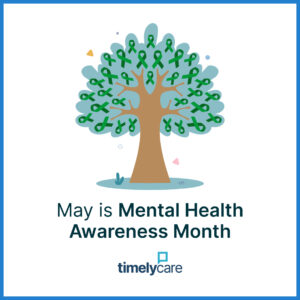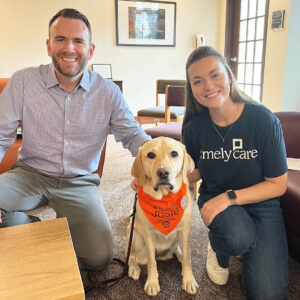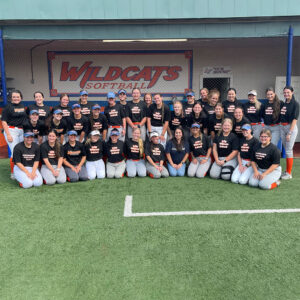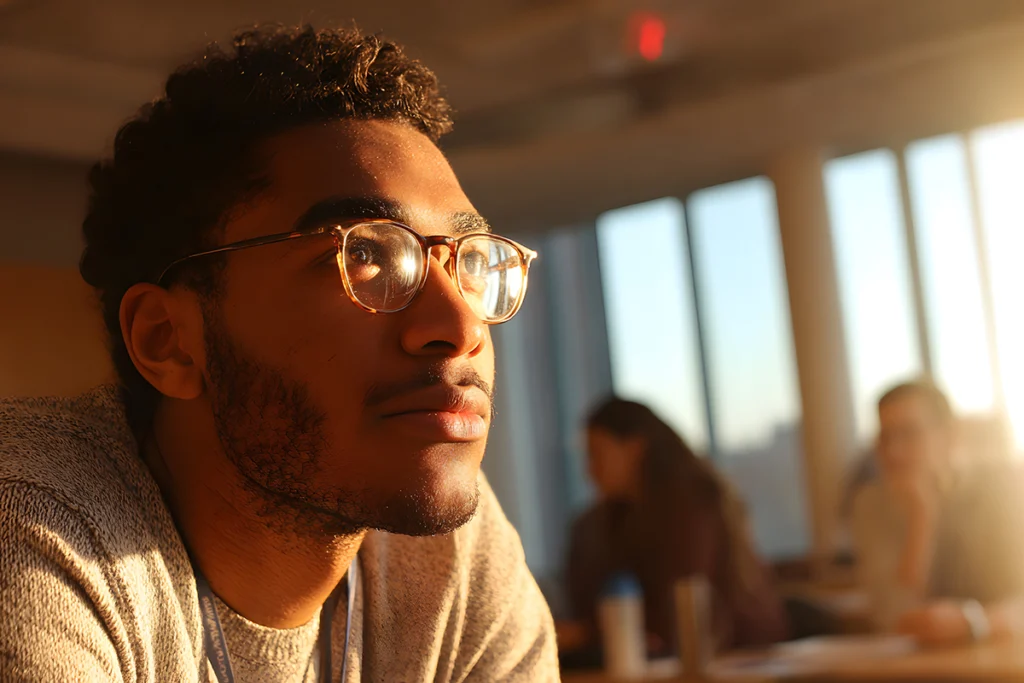Table of Contents
 A recent nationwide survey found nearly 60% of Gen Z college students have received mental health care before arriving on campus – during their K-12 years. Released in conjunction with Mental Health Awareness Month, this alarming statistic underscores the urgency of warnings from the CDC to the U.S. Surgeon General to increase awareness and action around a youth mental health crisis. Not only has mental health become a pressing public health issue, but it’s also the number one reason students drop out of college, with 69% of four-year students and 55% of two-year students who have considered withdrawing citing emotional distress as their primary reason.
A recent nationwide survey found nearly 60% of Gen Z college students have received mental health care before arriving on campus – during their K-12 years. Released in conjunction with Mental Health Awareness Month, this alarming statistic underscores the urgency of warnings from the CDC to the U.S. Surgeon General to increase awareness and action around a youth mental health crisis. Not only has mental health become a pressing public health issue, but it’s also the number one reason students drop out of college, with 69% of four-year students and 55% of two-year students who have considered withdrawing citing emotional distress as their primary reason.
While the campus mental health crisis for students of all ages and demographics is gaining a growing amount of attention from educators, government leaders, and clinicians, it was an issue long before COVID acted as an accelerant. Many college and university leaders already have made significant investments in creating a connected system of care that improves student outcomes by supporting student mental health. According to an annual survey by Inside Higher Ed, about two-thirds of presidents (65%) indicate that they plan to increase their institution’s capacity to meet the mental health needs of students, staff, and faculty members.
While available resources vary from campus to campus, the following best practices are common threads among colleges and universities that comprehensively address student mental health challenges as part of their institutional efforts to support student well-being and success.
How to Comprehensively Address Student Mental Health
1 Normalize and destigmatize mental health support

“Stigma around mental health issues is still a huge challenge for college students to overcome and campus counseling centers nationwide have been working to mitigate the effects of stigma,” said Ellie Sturgis, director of Cook Counseling Center at Virginia Tech. “Our animal-assisted therapy dogs are our ambassadors for mental health and they have been a huge asset to our team – and our most popular campus counselors!”
Now five years into its partnership with TimelyCare, Abilene Christian University has found that improved student mental health leads to improved student success outcomes.
“One of the things we know from student life is that when a student is engaged in the campus community, the student is more likely to retain and graduate. One of the best ways to keep a student engaged in the campus community is to keep them healthy,” said Kevin Campbell, Senior Vice President for Operations at Abilene Christian University.
2 Consider students' diverse backgrounds, identities, and lived experiences
Historically underrepresented groups, including racial, ethnic, gender, and sexual minorities, often experience poor mental health outcomes due to a lack of access to high-quality mental health care services, poor representation among available providers, discrimination, and cultural stigma about emotional health.
Ensuring a diverse and inclusive provider network can be a challenge for minority-serving institutions (MSIs), including Historically Black Colleges and Universities (HBCUs), Hispanic Serving Institutions (HSIs), and Tribal Colleges and Universities. Tierra Parsons, Director of Counseling Services at Johnson C. Smith University, an HBCU in Charlotte, N.C., said it’s important students have the opportunity to see themselves in the therapists they have available to them.
“We have requested that there are some therapists of color that look like our students so that it could help to address the stigma around mental health and make our students a little bit more comfortable with accessing and utilizing the services,” Parsons told The Chronicle of Higher Education. “Even down to the marketing — we specifically requested that the images and promotion have persons of color to represent different cultures…. And so we are just happy that we’re able to meet their needs in this way, especially on an HBCU campus.”
In keeping with its commitment to inclusion, TimelyCare’s diverse and culturally responsive provider network reflects and is proud to serve students who embody diversity in race, ethnicity, gender identity and expression, age, religion and worldview, language, health, ability, sexual orientation, socioeconomic and immigration status, and more. More than half of mental health providers identify as Black, Indigenous, or People of Color (BIPOC). With cultural competency upskilling by Violet, the TimelyCare platform also offers professionals who identify as LGBTQIA+, speak multiple languages, and translation services to support more than 240 languages. Students scheduling services can choose to meet with a specific provider or select the first available.
“To be able to go on this app, self-identify, say what’s going on with me, and then being able to find a queer man of color to talk to, that is so rare, and that is the second person I clicked on,” said Max Cartagena, a student at Cal Poly Humboldt in Arcata, Calif. “That isn’t available to me here and that wouldn’t be available to me without Timely.”
3 Recognize that mental health is a basic need
On this special #CCMonth edition of “In the Know”, Becky Laman (@timely_care) & Jerrod Hinders (@AmarilloCollege) talk all things mental health!
We address stigmas, the effects of the pandemic on students & access to services at #commcolleges. Tune in: https://t.co/hA72WQKuWf pic.twitter.com/H6PqcgI46k — ACCT (@CCTrustees) April 18, 2023
On a recent episode of “In the Know,” a podcast from the Association of Community College Trustees (ACCT), Jerrod Hinders, Counseling Center Coordinator at Amarillo College, talked about the correlation between mental health and other factors such as food, housing, and financial insecurity facing many of their students.
“We have to have a holistic approach to meeting these students’ needs, especially post-pandemic in which our world got really turned upside down. There was a lot of question if those basic needs were going to be met and that security, which inevitably has an effect on mental health,” said Hinders. “In order for us to be effective, we need to make sure we’re looking at the whole student, we’re looking at the whole situation and identifying how we can help with each of those pieces. The more pieces we can put into place the better we can be able to support them.”
4 Address mental health provider shortage areas
Ensuring 24/7 access to a diverse provider network is especially important when it may be several hours to a large city, or where people may feel isolated at times because of their remote surroundings – both of which are the case at Western Colorado University.
“As a rural community in Colorado, TimelyCare can really help students connect with someone to help them talk through their problems or a mental health crisis where some physical service in the Valley may not be available to them,” said Sam Micka, Assistant Professor of Computer Science, CIS Faculty Member/Faculty Senate, Western Colorado University. “Whether that’s because their health insurance doesn’t provide coverage for that provider, or if it’s because there just isn’t appointment availability because there’s a lot of people trying to see the very limited counselors in this Valley, or if they just can’t even get in touch with a family member, if they’re working through something and they need to talk to someone in confidence about a problem they’re experiencing, having that resource available is critical. And being able to connect any time of the day, at the click of a button, is truly incredible.”
Precious Allen, a student at Western Colorado University agrees. “Mental health is a big deal here in the Valley. We have a lot of cold months here and you can get the winter blues as we call it. You can get cabin fever really easily,” she said. “Having telehealth and TimelyCare has made a huge, significant difference on campus.”
5 Address student health and well-being as an entire system
System-wide agreements and system-enabling agreements provide opportunities for student services at scale, while enabling each institution to keep their autonomy to tailor to the unique needs of their campus communities. Beginning this summer, the Texas State University System will offer students at all of its campuses expanded access to mental health and basic needs support through a new partnership with TimelyCare. When Indiana University made its announcement about partnering with TimelyCare, President Pamela Whitten’s message was clear: “The health and well-being of our students is a top priority for me and our university as a whole.”
The Virginia Higher Education Procurement Consortium (VHEPC) manages $350 million in cooperative contract spending across the state, and Director Ryan Balber ensures that their agreements not only benefit VHEPC member institutions, but also other colleges and universities whenever possible. When Virginia Tech, Virginia Commonwealth University, James Madison University, and Virginia’s Community Colleges identified the need for a collaborative agreement for virtual mental health services, they decided that Virginia Tech would be the ideal lead agency and the other schools agreed to go in together, making it easy for public and private schools across the state to adopt the same terms and seamlessly add services. Today, about a dozen schools outside the state – including the University of Delaware, University of South Florida, and several member institutions of the Illinois Public Higher Education Cooperative – also have leveraged the cooperative buying agreement to reduce procurement red tape and expand access to care quickly and easily.
“They know if we’ve done the contract that it’s going to be done well and they’re going to benefit from the pricing,” said Balber.
6 Support the mental health of faculty and staff
Three years later only, about a third of respondents in Inside Higher Ed’s 2023 survey of college presidents felt their institutions had sufficient capacity to address the mental health needs of staff (37%) and faculty (36%). Employee assistance programs – always limited – now seem insufficient to deal with the daily stressors faculty and staff face.The last few years have been challenging for most people, and faculty and staff don’t check their authentic selves at the door when they get to work. That’s why many colleges and universities have expanded TimelyCare access to employees so that they can get the help they need, uphold the quality of the academic experience, bolster student academic performance, and better support student outcomes.
“Had we not partnered with TimelyCare, we’d have lost a tremendous amount of students, faculty, and staff at the university,” said Leroy Durant, Vice President for Student Development & Services at Claflin University. “I believe my staff would have probably told me, ‘This is too much. I just can’t deal with it.’ I don’t think I could have held on to my staff at all, and so I am happy I had some other services such as TimelyCare to provide for them.”
Burnout among care providers – physicians, nurses, counselors, and others in a caregiving role – became more commonplace and also contributed to the Great Resignation across higher education. In addition to helping them provide better care to students, providing faculty and staff with additional support services can help stem the tide and improve retention of employees.
“A year ago, retention of counselors was huge, a huge problem. We were losing six to seven counselors a year. Having access to TimelyCare to help what we’re doing, our ability to retain our counselors has improved significantly,” said Ellie Sturgis, Director of Cook Counseling Center at Virginia Tech, who added the only resignations I know of for next year are people who are retiring or whose families are relocating. “But it has really helped us with retention, and it’s really helped morale.”
7 Provide resources to reach the silent sufferers
With emotional and mental health resources designed to help students cope effectively with life and create satisfying relationships, Hopkins has creatively and systematically addressed everything from sleep through a program called Yawns Hopkins, to motivational interviews that coach students to make healthy changes pertaining to substance use and misuse.
In April 2020, like many colleges and universities, Johns Hopkins trusted TimelyCare (then TimelyMD) to provide 24/7 access to mental health counseling to students in the pandemic’s early stages when varied state licensure regulations limited care to students unless they were physically located in the same state as their campus counselors.
What Johns Hopkins found was that a significant number of TimelyCare visits occurred on nights and weekends, signaling the platform provided much-needed support to students who otherwise would not have gotten it.
“It helps us in reaching a broader group of students that we might not be reaching through our traditional counseling services,” Shollenberger told Inside Higher Ed. “We have been surveying students to get a sense of their experience … I’ve been struck by the number of students who said if we didn’t have TimelyMD in place, they wouldn’t have reached out.”
TimelyCare’s Peer Community and expanded self-care resources empower students to take ownership of their physical and emotional well-being without the need for a provider visit – improving health agency and literacy at a seminal time in their lives. Given that about half of students who have used Peer Community or self-care resources have not had a provider visit in the last three months, it’s clear that easy and self-guided on-ramps for support reach students who might not otherwise seek out a therapist.
8 Empower students to take the lead
Students at Northwestern University have a variety of peer advocacy groups that destigmatize mental health issues, raise awareness for campus resources, and support other students who may be struggling, including We Are SAATH (which focuses on the South Asian Community) and Active Minds. Active Minds is the nation’s premier nonprofit organization supporting mental health awareness and education for young adults, and its partnership with TimelyCare aims to broaden the conversation about mental health and create lasting change in the way mental health is talked about, cared for, and valued on campuses where both organizations have a shared presence, including Northwestern.
“One of Active Minds’ core tenants in working to improve the mental health outlook for students and young adults nationwide is connection,” said Markie Pasternak, Senior Manager for Higher Education at Active Minds. “Our partnership with TimelyCare leans into connection – providing users with the ability to get quality, real-time support from peers in a safe, digital setting. We believe that this Active Minds and TimelyCare partnership will help evolve the conversation around mental health from stigma to solutions.”
Jillian Allen, an Active Minds student leader at the University of Virginia, says many students feel more comfortable with self-guided and peer support resources they can use on their own time and in their own space.
“Having the more informal ability to share what you’re going through without it being an appointment with a counselor is huge,” Allen said. “With the Peer Community feature, I think people enjoy getting stuff off of their chest and sharing it anonymously. Reading and responding to the posts, even giving little responses like, ‘you’re not alone,’ helps me in my own life and feeling comfortable to say, ‘I think I’m ready to talk with someone.’ Whether they take that next step or not is up to them, and they know the option is always available through TimelyCare.”
9 Champion student-athlete mental health

Many campuses, athletic departments, and coaches are partnering with organizations such as The Hidden Opponent, a non-profit and advocacy group that raises awareness for student-athlete mental health and addresses the stigma within sports culture, or Sidelined USA, a non-profit that exists to reunite permanently-sidelined athletes with their passions and inspire them to find a meaningful way forward. When colleges and universities team up with TimelyCare, they gain access to licensed providers in all 50 states who are specially trained in delivering mental health support that embraces and reflects the unique needs of student-athletes.
“There is no greater priority than the health and safety of our students and we recognize the additional pressures our student-athletes face in addition to their academic workloads,” said Morehead State University Director of Athletics Dr. Jaime Gordon in an announcement about making 24/7 equitable access to expanded mental health resources available to student-athletes. Whether they are at home or on the road, he said, “TimelyCare’s ease of use, convenience, and immediacy make it easier than ever for our students to get on-demand support.”
10 Prepare for and respond to crises with a culture of caring
According to the CDC, suicide is the second leading cause of death for people ages 10-34. A recent nationwide survey of more than 1,200 students found mass shootings were in their top-five sources of stress and anxiety. Every instance of violence – self-inflicted or otherwise – has a ripple effect that transcends the boundaries of campus, and it takes an all-hands-on-deck approach to support the entire community.
Additionally, how campuses prepare for and respond to traumatic events can reduce risk, save lives, and prevent suicide contagion, or the concept that when one person dies by suicide that others in a community may be at higher risk.
The Jed Foundation (JED), a leading non-profit focused on protecting emotional health and preventing suicide for our nation’s teens and young adults and TimelyCare partner, operates the JED Campus program that guides schools through a collaborative process of comprehensive systems, programs, and policy development with customized support to build upon existing student mental health, substance use, and suicide prevention efforts.
Case Western Reserve University, a JED Campus and TimelyCare partner in Cleveland, Ohio, has put thorough prevention and postvention plans into place to help its campus community respond to crises in a calm, consistent, and caring manner.
“Prevention is worth every bit of upfront work that you can manage on your campus, which includes having a comprehensive toolbox of resources for students to support their own mental health, which will inevitably turn into students supporting each other,” said Hillary Jones, Director of Acute Mental Health Care, Crisis Response, and Care Management at Case Western Reserve University. “Being understood in a crisis is so significant – it is critical to prepare, which includes knowing your campus, knowing what your students’ needs are, and responding to current events accordingly.”

On a recent episode of “In the Know,” a podcast from the Association of Community College Trustees (ACCT), Jerrod Hinders, Counseling Center Coordinator at Amarillo College, talked about the correlation between mental health and other factors such as food, housing, and financial insecurity facing many of their students. “We have to have a holistic approach to meeting these students’ needs, especially post-pandemic in which our world got really turned upside down. There was a lot of question if those basic needs were going to be met and that security, which inevitably has an effect on mental health,” said Hinders. “In order for us to be effective, we need to make sure we’re looking at the whole student, we’re looking at the whole situation and identifying how we can help with each of those pieces. The more pieces we can put into place the better we can be able to support them.”On this special #CCMonth edition of “In the Know”, Becky Laman (@timely_care) & Jerrod Hinders (@AmarilloCollege) talk all things mental health!
We address stigmas, the effects of the pandemic on students & access to services at #commcolleges. Tune in: https://t.co/hA72WQKuWf pic.twitter.com/H6PqcgI46k — ACCT (@CCTrustees) April 18, 2023

Turning Best Practices into Action Plans
Whether students are on or off campus, developing a comprehensive approach to student health and well-being requires meeting students where they are with resources to improve their mental health whenever, wherever, and however they need support. Contact TimelyCare to learn how a student-centered approach to mental health today can improve student success outcomes tomorrow.





